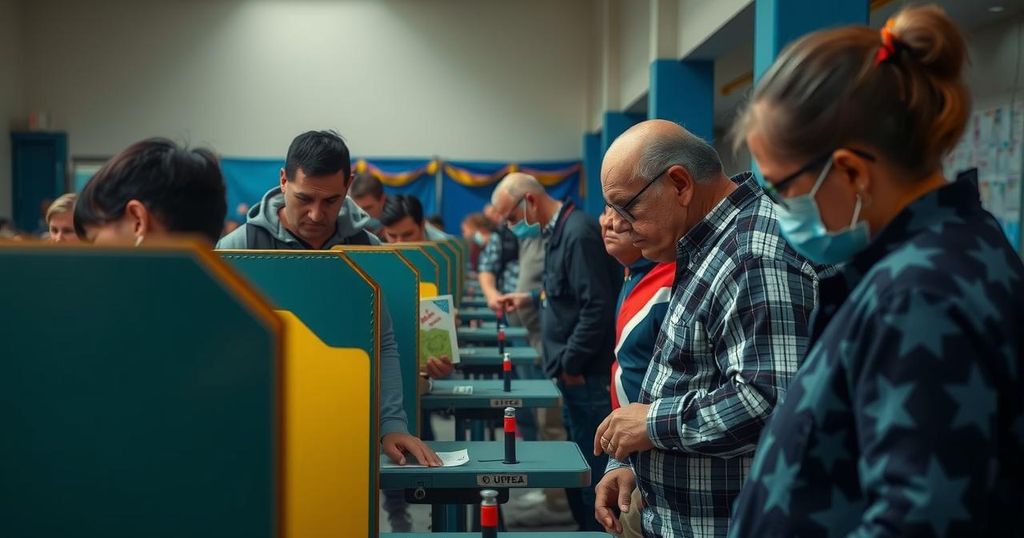World news
2024 ELECTIONS, ARGENTINA, ASIA, BRAZIL, BRICS, COLORADO PARTY, CUBA, DELGADO, ELECTION, ELECTIONS, FRENTE AMPLIO, JOSE “ PEPE, LUIS LACALLE POU, MEXICO, MUJICA, NATIONAL PARTY, NORTH AMERICA, OR, PHILIPPINES, PRESIDENTIAL ELECTION, SOUTH AMERICA, TRADE RELATIONS, URUGUAY, VENEZUELA, VOTER TURNOUT
Daniel O'Connor
0 Comments
Uruguay’s Presidential Run-off: Leftist Bloc Seeks to Reclaim Power
Uruguay’s presidential run-off election sees leftist candidate Yamandu Orsi competing against right-wing Alvaro Delgado. With polling indicating a closely contested race, voters will decide whether to maintain the current conservative leadership or return to a leftist government after five years. Candidates are focusing on attracting undecided voters amidst economic challenges and differing party strategies, all while public sentiment remains uncertain after recent debates.
Voting commenced in Uruguay’s pivotal presidential run-off election, as supporters of the leftist coalition, spearheaded by the esteemed former President Jose “Pepe” Mujica, hope to reclaim leadership after five years of conservative governance. Polling stations were open from 8:00 AM to 7:30 PM, with initial election results anticipated shortly afterward. The runoff presents a choice between leftist candidate Yamandu Orsi of the Frente Amplio (Broad Front) and Alvaro Delgado of the National Party.
The current political landscape appears to be less polarized compared to recent elections in other regional countries like Argentina and Brazil, with significant overlap between conservative and liberal factions. Despite this, the ruling coalition under President Luis Lacalle Pou has faced challenges, particularly regarding its crime policy, even though it reports rising employment and wages. Results from the last election suggested a narrowly divided electorate, with Orsi having secured 43.9% and Delgado 26.8% in the first round.
Orsi aims to maintain a moderate stance, assuring the public that a radical policy shift is not in the cards, while Delgado is campaigning on the premise of continuity, labeling the current government as a good one. Both candidates are vying for support from undecided voters, including those who backed smaller parties or did not participate in the previous election, but so far, neither has introduced new policy pledges to attract them. Public sentiment toward the candidates remains uncertain, as evidenced by a local resident’s expression of indecision following a televised debate.
The outcome of this election could reflect whether Uruguay will follow the global trend of incumbent parties losing ground amidst rising inflation and living costs, as evidenced in recent elections in other nations like the United Kingdom and Japan.
This article discusses Uruguay’s presidential run-off election, highlighting the competition between the leftist Frente Amplio coalition and the right-wing National Party. It specifically focuses on the significance of this election in contrast to prior elections in Latin America, characterized by heightened polarization. The election is also crucial for assessing public sentiment towards the outgoing conservative government amidst economic challenges faced by voters.
In conclusion, the upcoming election in Uruguay stands as a critical juncture for both leftist and right-wing factions, each presenting distinct visions for the country’s future. With closely contested views and a politically moderate atmosphere, the outcome will not only determine the immediate leadership but may also reflect broader trends influencing voter sentiment. As the electorate navigates choices in the context of economic strains, their decisions will be pivotal in shaping Uruguay’s political landscape moving forward.
Original Source: www.aljazeera.com




Post Comment